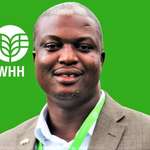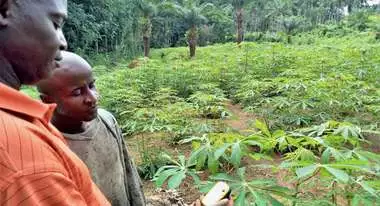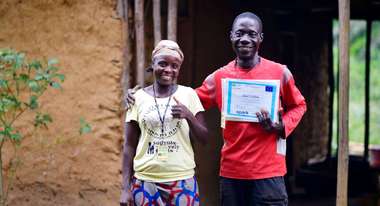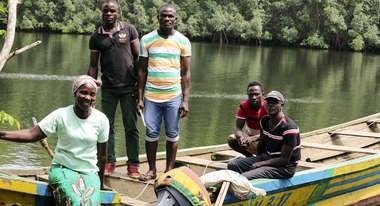A Bridge Against Hunger
In Liberia, Welthungerhilfe is working together with communities to improve agriculture. The program also builds motorcycle tracks, bridges and hospitals, driving technological progress. The outcome is a healthier and safer diet for the communities, an integral pillar in the fight against hunger.

Vera and Jutay were lucky. But it is far more than luck that changed their lives: an opportunity they seized, hard work and hope that a better life is possible. Vera, 33, lives with her children in Zwedru, the capital of Grand Gedeh County in south-eastern Liberia. From her tin-roofed house, she points to a building constructed with bamboo sticks and palm thatch, whose inhabitants loudly introduce themselves. They are pigs, curious to see who is coming to visit.
In 2021, Vera began participating in a Welthungerhilfe (WHH) training program. She chose agriculture, focusing on pig farming. "There are only a few people in Zwedru who breed pigs," she says. "I was convinced that this would help us to have a better life."

Pig farming secures livelihoods
WHH has been carrying out projects in Liberia since 2003. The focus is primarily on the south-east, the country's poorest region. Most people in Grand Gedeh, River Gee and Maryland lack clean water, sanitary facilities, food, energy, and educational opportunities. More than half of the population is at risk of chronic malnutrition, and over a quarter must survive on less than two euros a day.

There are only a few people in Zwedru who breed pigs. I was convinced that this would help us to have a better life.
Vera Zulu Pig farmer from Zwedru"I have discovered a world of knowledge," says pig farmer Yutay. "Breeds, rearing, care, nutrition and health – it completely fascinated me." The training lasted ten months. At the end, all participants received two piglets – a sow and a boar. Just over a year later, Yutay already has a herd of 20 animals, and Vera also has a dozen piglets scurrying around the farm. The money they now earn from selling their pigs is enough to live on and pay the school fees for Vera's children and Yutay's brothers.

Jutay describes the country's 80 percent unemployment rate as a "specter." "That was always the dead end for my dream of a better future." Like him and Vera, 70 percent of the Liberian population is under 35. There is enormous potential that lies largely untapped in the endless cycle of a lack of qualifications, unemployment, poverty, food insecurity, and poor health care.
Consequences of the civil war can still be felt today
In the 1950s, Libera was considered the most progressive country in Africa and – after Japan – had the highest economic growth in the world. To understand why the country is now one of the poorest in the world, it is worth taking a brief look at its recent history. In 1989, a cruel civil war began between ethnic groups and warlords over power and resources. It lasted 14 years and claimed an estimated 250,000 lives out of a population of 3.5 million people at that time. The infrastructure was destroyed, the economy collapsed, and half the country was on the run.
Even more than 20 years later, much of the infrastructure is yet to be rebuilt. Just as Liberia was beginning to recover from the consequences of the civil war, an Ebola epidemic broke out in 2014. Five thousand people died, fields lay fallow, there was no feed for the animals and even less work.

Improving the safety of goods transportation
Things are now looking up for Vera. Her biggest problem is no longer hunger, but good feed for her pigs. There isn't enough in Zwedru, but there is in the Ivory Coast – less than 30 kilometers away as the crow flies. However, the unpaved roads are barely usable in the rainy season. In the nearby border community of Janzon, people use motorcycle cabs almost exclusively to transport goods, which are at least maneuverable. Sometimes, they even use bush paths to get to their destination. But with a price. Motorcycles overturn on the route almost daily – often with fatal consequences for the passengers.

In Janzon, WHH launched a project that initially trained young people in manual skills and then supported them in building motorcycle tracks. The resulting seven- and two-kilometre-long tracks have since served as important traffic arteries for the 17 villages and their 6,000 inhabitants.
The flooded roads in Janzon stem from the Gee River, a good 100 kilometers further south. It separates the town of Feloken in Maryland County from River Gee County. Men, women and children used to shimmy across a rotten, swaying suspension bridge here. People died several times when the bridge collapsed after heavy downpours. Since February 2023, the River Gee has been rushing under a 22-metre-long stable concrete bridge. It is the result of another WHH project, implemented with a local construction company: 22 meters for more safety, income, available food, and better access to health facilities.
Rebuilding the healthcare system
The fact that the hospitals in Liberia are rarely visited is not only due to the destroyed infrastructure and low income. During the Ebola outbreak, the public clinics failed completely. Catastrophic hygiene conditions and poor organization led to the widespread thought: "I won't go to hospital; I'll get even sicker." For fear of contracting Ebola, illnesses such as malaria, pneumonia and severe diarrhea often went untreated.

In addition, only a good half of the people in Grand Gedeh have access to an easily accessible healthcare facility. For this reason, WHH began building eight clinics and is also ensuring development here. The largest is the district hospital of Grand Gedeh in Zwedru. Water supply systems, solar energy for the power supply, biomedical equipment, and specialist training are intended to establish the necessary hygienic and professional standards. More than 120,000 people in Grand Gedeh and the neighboring counties will benefit from this. The clinic has particular areas for women: in addition to gynecology and obstetrics, there are separate family planning services.
Education, health, and infrastructure support the upswing in local agriculture, which is so urgently needed to provide work, but above all to ensure sufficient availability of food for the local population. Climate-related events such as floods and droughts, among other things, make production more difficult.
Amenu translates to: ‘We will make it.’
Agricultural challenges are a fact of life for the 889 members of the Amenu Agricultural Cooperative in Zleh Town. 60 percent of the members are women. One of them is Yamah. She has been growing rice for over five years. The family eats most of the annual harvest of between 30 and 50 kilos. However, the proceeds from the sale of the small surplus were not enough to finance the household and the education of her three children, let alone to invest in the business.

In 2023, WHH worked with the cooperative to repair the irrigation system that had collapsed during the civil war, trained the farmers, procured resilient seeds and financed three motorized hoes to cultivate more land with less work. "Before, irrigation by hand was an insurmountable challenge," says Yamah. "Now we can harvest twice a year, have more food on the table and more money left over." In January 2024, Yamah's harvest was already well over 100 kilos.
Sustainable food security means development, building knowledge, strengthening hope, self-confidence, courage, and strength to take control of one's own life. Jutay's family marvels at the growth of the pig herd every day. "People are laughing happily in our house again," says Jutay. And Vera wants to expand her farm "and employ people from my community there." Hundreds of new and former farmers are returning to the farms in the Amenu cooperative. As the oldest farmers' association in the country, the "Amenu" cooperative is making a fresh start with modern approaches. "Amenu" means "We will make it" in the local language.
Abraham Nyorkor was part of the WHH team in Liberia until March 2024.







